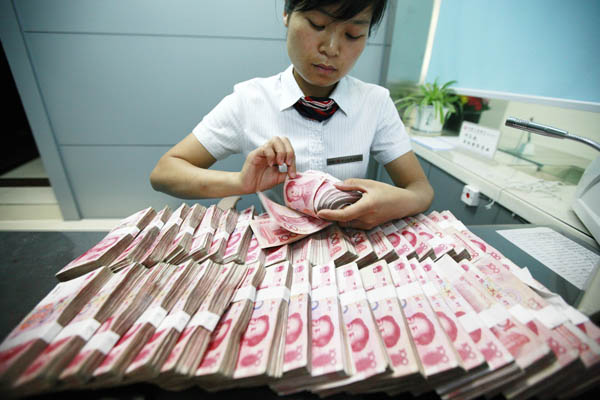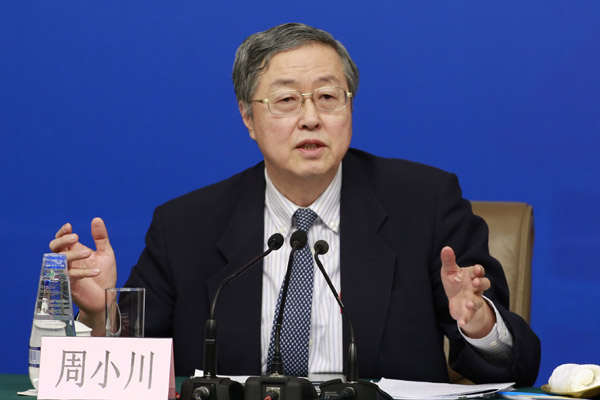 Death toll in Philippine ship collision climbs to 31
Death toll in Philippine ship collision climbs to 31
 Guangzhou rail service suspended, 80,000 affected
Guangzhou rail service suspended, 80,000 affected
 World's most famous beach cities
World's most famous beach cities
 Indian-controlled Kashmir celebrates Independence Day
Indian-controlled Kashmir celebrates Independence Day
 Reservoirs in S China start to release floods
Reservoirs in S China start to release floods
 Actress Hsu Chi covers BAZAAR
Actress Hsu Chi covers BAZAAR
 How do North Koreans stay cool in summer?
How do North Koreans stay cool in summer?
 China Beijing Int'l Gifts, Premium&Houseware Exhibition opens
China Beijing Int'l Gifts, Premium&Houseware Exhibition opens
 If you ever find love in Beijing
If you ever find love in Beijing
 |
| The momentum of China's economic growth is still robust, and consecutive declines in GDP growth rates are unlikely, People's Bank of China Governor Zhou Xiaochuan said. Zhou said the central bank plans to maintain its prudent monetary policy.XIE ZHENGYI / FOR CHINA DAILY |
GDP growth rate of about 7.5% seen as normal level, PBOC's Zhou says
No major falls will be allowed in China's economic growth rate, and no major changes will have to be made in its monetary policy either, the central bank governor said on Monday.
Zhou Xiaochuan, governor of the People's Bank of China, said the monetary authority will maintain its stance in the second half of the year, "although some minor adjustments might be needed."
China will continue to implement its "prudent" monetary policy, he said in an interview with China Central Television.
Zhou said that an economic growth rate of about 7.5 percent is at a normal level.
"Against the backdrop of the weak global economy, it's already not easy for China to secure such stable economic growth, with more than 7 million new jobs in the first half," he added.
China's GDP growth rate fell to 7.5 percent in the second quarter, from 7.7 percent three months earlier, according to data from the National Bureau of Statistics.
Zhou said the domestic momentum driving China's growth is still robust, and a consecutive drop of GDP growth is unlikely.
Zhou Xiaochuan, Central Bank governor
"We'll find a balance point, where we can not only maintain relatively quick growth, but also optimize the economic structure, and thus leave space for undertaking further reforms," he said.
Zhou said China will reiterate its multiple targets for monetary policies, to make sure that the monetary stance takes economic growth, employment, inflation and the international payment situation into account.
In response to a question on whether the country will see another liquidity crunch as it did in the interbank market in June, Zhou said that China's market liquidity is ample in the medium term, and won't be affected too much by short-term turbulence.
On Monday, the seven-day repo rate — an indicator of funding availability in the banking system — rose 35 basis points to 4.18 percent, the biggest increase since July 29, according to data compiled by Bloomberg News.
Zhou also said that the monetary authority is prepared to liberalize commercial lenders' deposit interest rates.
"We've got the techniques and other conditions prepared for realizing such liberalization as soon as possible," he said in the CCTV interview.
"I'm optimistic about it. As far as I'm concerned, the process is being promoted according to the original plan," Zhou said, adding that the central bank has done all the preparation.
China scrapped the lower limit on bank lending rates and thus ended controls on lending rates in July, in a major step toward rate liberalization. But analysts argued that the key to interest rate reform still lies in loosening the upper limit for deposit rates.
At the time, the central bank said it had not touched the ceiling for the deposit rates because that's the riskiest part of the reform and must be implemented step by step.
Zhou said the removal of lending rate controls wouldn't cause substantial change in the lending rates. Instead, the change lies in introducing more pricing flexibility and liberty.
"We've noticed that banks have been making progress in extending more loans to small and medium-sized enterprises and to the agricultural sector. At present, financial services still lag behind the funding demand of the real economy."
He added that the government will keep the exchange rate of the yuan at a "reasonable" level, while the country is getting ready to further open up its financial market.
 PLA's integrated battle group in live-fire drill
PLA's integrated battle group in live-fire drill Egypt's clashes kill 525 so far
Egypt's clashes kill 525 so far Phubbers turn social etiquette on its head
Phubbers turn social etiquette on its head Jaguar Land Rover to recall 11,852 cars
Jaguar Land Rover to recall 11,852 cars Ballet Swan Lake rehearsed in Taipei
Ballet Swan Lake rehearsed in Taipei  The five Hutong areas of Beijing
The five Hutong areas of BeijingDay|Week|Month